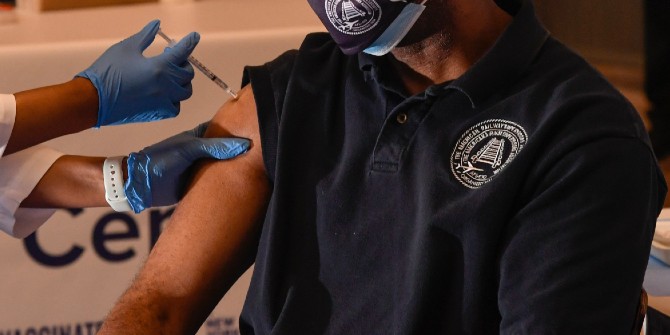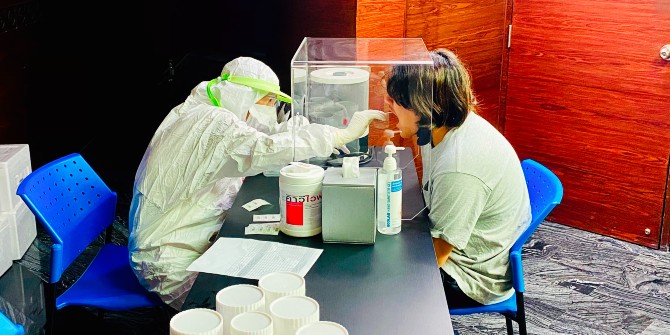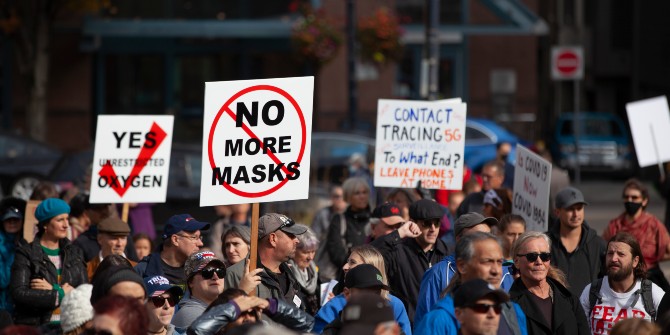Vaccine hesitancy remains a problem. Patrick Sturgis (LSE), Ian Brunton-Smith (University of Surrey) and Jonathan Jackson (LSE) find that people who live in societies where trust in science is high are more confident about vaccination.
While there is much that we are yet to understand about the coronavirus, on one issue there is near universal agreement amongst experts – we will not return to normal life until the majority of the world’s population has been vaccinated. An intense effort is now underway to deliver this objective, and a number of countries, including the UK, have already vaccinated a majority of their people.
Up until now, the focus of attention has been on obtaining stocks of vaccines, as national governments vie to maximise their share of a limited global supply. Yet in the months ahead it seems likely that concern will shift from supply to demand, as the willing are inoculated and those still to receive the vaccine are hesitant or unwilling to take it. Vaccine hesitancy and refusal matter because, unlike other medicines, vaccines work at both the individual and the societal levels. Without achieving high rates of immunisation, the coronavirus is likely to remain an endemic threat. While the exact threshold is yet to be determined, it seems likely that countries will need to achieve a vaccination rate of over 70% to attain ‘herd immunity’.
Worryingly, survey evidence suggests that substantial minorities in many countries will refuse to be vaccinated. For example, a survey by Imperial College London in November 2020 found only minorities reporting they would definitely get vaccinated against COVID in Canada, Germany, Japan, Singapore, and France. More recent evidence suggests that hesitancy may be declining as the rollout progresses, but the recent emergence of rare side-effects and the suspension of the AstraZeneca and Johnson & Johnson vaccines in some countries seem likely to raise doubts in the minds of the unvaccinated. Addressing vaccine hesitancy is likely, then, to be at the forefront of the next stage of the battle against COVID.
In our new article published in the journal Nature Human Behavior we investigate how trust in science drives vaccine confidence, using a unique global survey of public attitudes to science, the 2018 Wellcome Global Monitor, which covers over 120,000 people in 126 countries. Until now, attention to vaccine confidence has focused almost entirely on individual level trust within single country contexts, with a wealth of evidence that trust in science serves as a key psychological factor underpinning vaccine acceptance. Thinking through the rights and wrongs—the benefits, risks and hazards—of vaccination may take a good deal of (error-prone) effort, especially if one has little knowledge and experience of the issues involved. So people rely instead on the ‘cognitive shortcut’ of trust (or mistrust) in science and scientists.

What is new about our research is that we consider the role of societal level trust in science. We ask whether people living in societies with a higher level of trust in science are more confident about vaccination, over and above their own individual level of trust. And, in addition to considering country-level differences in average levels of trust in science, we also assess the role of societal consensus about it. People who live in countries with a strong supportive culture for science will (a) be more likely to trust science and (b) rely more heavily on trust as a decision heuristic. This helps them reach a position on vaccination that aligns more strongly with the dominant normative view around the scientific and regulatory systems that underpin vaccination programmes.
Findings from the Wellcome Global Monitor survey
The 2018 Wellcome Global Monitor reveals a high level of trust in science globally, with more than four fifths reporting ‘some’ or ‘a lot’ of trust in science, and similar numbers reporting this level of trust in scientists (85%) and their ability to find out accurate information about the world (85%). Trust in science is highest in North America, Western Europe, and Australasia and lowest in South America, Eastern Europe, and Africa.
Figure 1: Percentage trusting science ‘some’ or ‘a lot’

Note: Countries shaded grey were not included in the Wellcome Global Monitor survey.
Confidence in vaccines is even higher, with 93% globally that vaccines are important for children to have, 81% globally agreeing that vaccines are safe, and 86% that vaccines are effective. The highest levels of vaccine confidence are found in Africa and parts of Asia, and the lowest levels in Eastern Europe.
Figure 2: Percentage agreeing vaccines are effective

Note: Countries shaded grey were not included in the Wellcome Global Monitor survey.
There is also a lot of variation between countries in the level of social consensus about whether science can be trusted. The figure below shows within-country standard deviations for trust in science, which we use to summarise the degree of social consensus. Note that (somewhat confusingly) higher scores here indicate more within-country variability and, therefore, a weaker social consensus on trust in science. The Czech Republic has the lowest social consensus, with Guinea, Romania, Botswana and the United Arab Emirates also showing particularly low levels of agreement about whether science can be trusted. At the other end of the spectrum, Thailand, Latvia, Togo, Iran, Nepal, Italy, and Japan are the countries with the highest national consensus on trust in science.
Figure 3: Variation in social consensus that science can be trusted across 122 countries

We assess whether this variability in consensus across countries shapes the relationship between trust in science and vaccine confidence, at both the individual and societal levels. We find that people in countries with higher average levels of trust in science are also more confident about vaccination, even accounting for the well-established positive effect of individual level trust in science. We also show that relationships between scientific trust and vaccine confidence are moderated by the strength of societal consensus around trust in science – at higher levels of consensus that science is trustworthy, the association between trust and vaccine confidence is greater for both individual and country level trust in science.
This moderating effect can be seen in the figure below which plots the association between country level trust in science (x axis) and individual level vaccine confidence (y axis) at different quintiles (Q1 to Q5) of societal consensus. Within countries, trust in science is positively related to vaccine confidence only when social consensus around trust in science is strong (left hand panels). In countries where consensus is weaker (right hand panels), trust in science is not significantly associated with vaccine confidence.
Figure 4: Societal consensus moderates the relationship between trust in science and support for vaccines

The same moderating effect of social consensus is also evident in the figure below for individual-level trust within countries, albeit to a lesser extent. The effect of individual trust in science on vaccine confidence is weaker when there is less societal consensus that science and scientists can be trusted.
Figure 5: The effect of individual trust in science is weaker when there is less societal consensus that science can be trusted

The importance of societal context
As with the protective effects of vaccines, public confidence in immunisation programmes is underpinned by factors operating at the societal as well as the individual level. In countries where trust in science is high, people are also more confident about vaccination, and in countries where consensus that science and scientists can be trusted is high, the effect of trust in science on vaccination confidence is stronger. This moderating effect is apparent when considering both the between and the within country association between trust in science and vaccine confidence.
Our findings point to the importance of looking beyond individual level drivers of vaccine confidence. Trust in science seems to be most powerful in shaping vaccination confidence when there is a normative consensus around the value of science in one’s country. Just as immunisation works at the population level—the more widespread the uptake the better—so it seems that trust in science is most effective in fostering vaccination confidence when it is widely agreed upon in society. A crucial area for future research will be to identify which factors contribute to the production of societal consensus around trust in science, to inform effective public communication strategies around vaccination programmes.
This post represents the views of the authors and not those of the COVID-19 blog, nor LSE.





